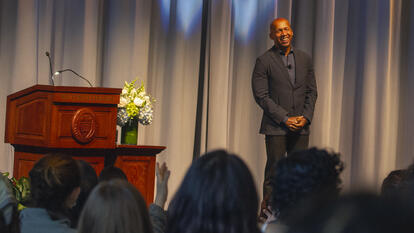Wellesley College Receives First-gen Forward Designation, a National Honor for Commitment to First-generation Student Success

Wellesley, MA (March 3, 2021) – Wellesley College has been designated a First-gen Forward institution by the Center for First-generation Student Success, an initiative of NASPA (Student Affairs Administrators in Higher Education) and The Suder Foundation.
The 2021–22 First-gen Forward cohort is made up of institutions of higher education that have demonstrated a commitment to improving experiences and advancing outcomes of first-generation college students. Selected institutions receive professional development, community-building experiences, and a first look at the center’s research and resources.
“This award recognizes our faculty and staff’s amazing efforts to support equitable outcomes for all students,” said Rebecca Garcia, a dean of the class of 2023 and director of WellesleyFirst and WellesleyPlus, who applied for the designation on behalf of the College. “It highlights our work in investing in the life of first-generation students. Through this commitment, innovation, and willingness to care, first-generation students at Wellesley have access to campus opportunities that were once not available to them. The connection to NASPA and First-Gen Forward will allow us to expand on the work we have begun together in recent years.”
Under Garcia’s direction, for the past four years WellesleyFirst has supported first-generation students, students from underrepresented groups, and those from under-resourced backgrounds. WellesleyFirst encompasses four primary initiatives: targeted resources, scholarship programs, fellowship programs, and STEM research. These efforts have expanded outreach beyond some long-standing signature programs, including WellesleyPlus—for first-year students—and the Sophomore Early Research Program, to ensure that students have access to needed resources such as research and mentorship opportunities.
“Our goals are to ensure students have meaningful learning experiences in and outside of the classroom; increase their positive self-efficacy and their commitment to health and wellness; and ensure the obstacles to obtaining a college degree are removed,” Garcia said. “Ultimately, we want students to know they are part of a community that cares about their success and their day-to-day experiences on campus.”
Other resources on campus include Mastercard Foundation Scholars, QuestBridge, and the First-generation/Low income (FLI) Network, which foster community for first-generation college students, build a network of mentors and mentees, and guide students on their academic and career journeys.
“Dean Garcia and her staff’s efforts and accomplishments exemplify Wellesley’s broader commitment to inclusive excellence,” said Sheilah Shaw Horton, vice president and dean of students. “All across the College, we are striving to foster an environment where all students can thrive. This First-gen Forward designation will allow us to exchange best practices, communicate, and collaborate with an incredible network of other colleges and universities, and help strengthen our approach to this vital, ongoing mission.”
In the College’s Science Center, Cathy Summa, associate provost and director of the Science Center, and Ayana McCoy, assistant director of the center, have been spearheading efforts to get more first-generation students access to science research opportunities, and have focused on STEM persistence at Wellesley. The McNair Scholars Program and our STEM Posse program are committed to preparing first-generation college students for graduate school and careers in STEM.
“I am delighted to learn of this recognition for the leadership that Dean Garcia has been providing to support our first-gen and other underrepresented students. It’s so well deserved,” Summa said. “She has been an amazing partner in our efforts to support the full diversity of our student population in the sciences; her partnership has enabled us to make strong progress toward our goals of increasing STEM persistence among underrepresented students. It truly takes a village, and she is one of our most trusted advisors.”
Additionally, Wellesley faculty in several departments have been rethinking the accessibility of courses and finding ways to create environments that support students from a wide variety of backgrounds. The physics department, for example, conducted a self-study in 2015 to determine strengths and weaknesses in its program, to rethink the curriculum content and how faculty teach it, and to consider ways it could provide a more inclusive community to students with diverse backgrounds and career aspirations. Wellesley’s writing program and philosophy department have taken similar steps, implementing a program to encourage upperclass students to act as mentors, particularly for first-years.
As members of a First-gen Forward institution, faculty and staff will have multiple opportunities to engage with peer institutions who are also creating environments that improve the experiences and outcomes of first-generation students. Selected institutions will send representatives to the First-gen Forward Workshop slated for early June and will participate in monthly phone calls, virtual professional development, goal setting, blog development, annual reporting, and more. After two successful years in the program, institutions are eligible to apply for the center’s Advisory leadership designation. At Wellesley, Horton and Garcia are also planning for a new advisory committee on campus that will work to review and respond to the ongoing needs of first-generation college students at Wellesley.
To learn more about first-generation efforts at Wellesley, visit WellesleyFirst. To learn more about the Center for First-generation Student Success, visit firstgen.naspa.org.



